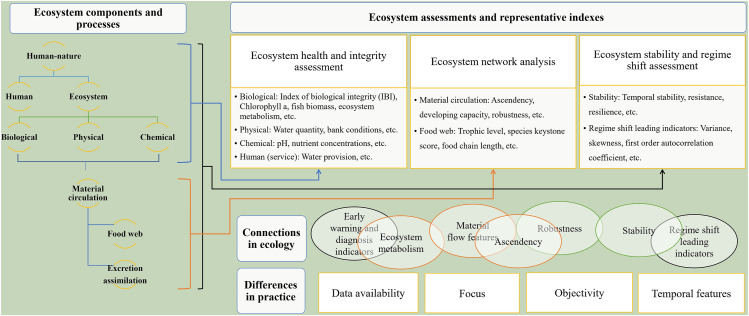
题目 Title
A holistic view of aquatic ecosystems: Integrating health and integrity, network, stability, and regime shift assessments
期刊 Journal
International Journal of Sediment Research (IF= 3.6)
作者 Author
Huang, L.; Meng, J. N.; Xu, F. L.; Zhou, Y.; He, G. J.; Wang, K.; Fang, H. W.
摘要 Abstract
Aquatic ecosystems, especially freshwater ecosystems, are facing increasing anthropogenic disturbances, highlighting the urgency for accurate ecosystem assessment for informed decision-making and effective management. While ecosystem health and integrity assessments have been widely applied, they often focus on ecosystem elements, overlooking their interconnections and dynamic characteristics. Establishing an integrated ecosystem assessment framework is vital to apply a comprehensive perspective in evaluations. In the current paper, a systematic review of aquatic ecosystem assessment methods is done, encompassing health and integrity assessment, network analysis, and stability and regime shift assessment. These approaches consider not only the individual elements but also the complex interconnections and dynamic characteristics within the ecosystem, which have been rarely studied due to limitations in field data availability. A case study of Poyang Lake is further presented for practical demonstration on the specific operation of the combined assessments. The integration of aquatic ecosystem assessment with ecological modeling is strongly advocated because it not only helps overcome the limitations of field data for assessing historical or current conditions, but it also enables prediction of future developments.
简介 Brief introduction
水生生态系统,尤其是淡水生态系统,正面临着越来越多的人为干扰,因此迫切需求对生态系统的准确评价,以支持科学的决策和有效的管理。生态系统健康与完整性评价已经得到了广泛的应用,但它们往往只关注生态系统的各个元素,而忽视了元素之间的相互联系和动态特征。因此,构建综合的生态系统评价体系,对于全面的生态系统评价是必要的。本文系统回顾了水生生态系统评价方法,包括健康与完整性评价、网络分析、以及稳定性和瞬变评价。上述方法不仅考虑了生态系统中的各个元素,还考虑了元素间的复杂联系和动态特征,这些特征由于数据可获取性的限制而鲜有研究。同时,本文以鄱阳湖为例展示了该综合评价体系的实际应用。考虑到生态模型不仅能克服历史和现状数据缺失的局限性,还能预测未来变化趋势,强烈建议将水生生态系统评价与生态模拟相结合。
扫码关注立方体公众号,实时追踪课题组最新科研进展



